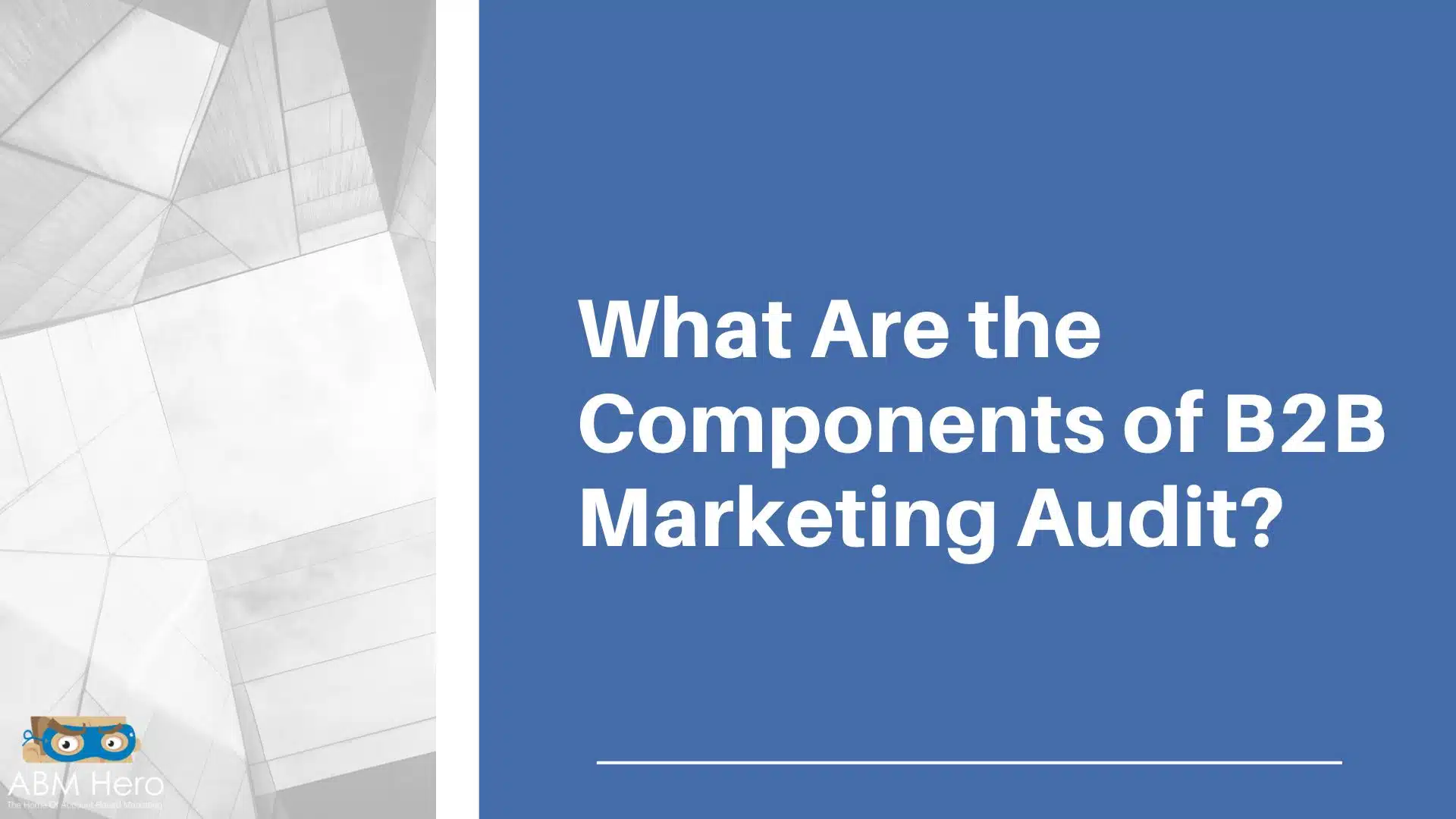Marketing audit for B2B organizations has become increasingly complex with the rise of technology and the need to reach a larger audience.
A marketing audit is a critical tool used by marketers to assess the effectiveness of their marketing strategies, identify areas of improvement, and optimize their efforts.
This blog post will explore the importance of the B2B marketing audit and how it can influence modern marketing best practices.
We will also discuss a successful audit’s key components and tips to help you get started.
What Makes an Effective Marketing Audit?
An effective B2B marketing audit must take into consideration a variety of factors to be successful. Primarily, the focus should be on evaluating the overall marketing strategy and its effectiveness in achieving desired goals.
It should include assessing the current target audience, the channels used to reach them, and the messaging and branding used in the campaigns.
Additionally, the audit should consider the metrics used to measure success, such as lead generation, conversion rates, customer retention, and loyalty.
Furthermore, an effective audit should consider the competition, changing trends, and customer behaviors in the marketplace.
Lastly, an audit should also look at the internal marketing resources and processes and ensure they are being used to their maximum potential.
Marketing Environment Audit
When examining the marketing environment of a B2b company using an account-based marketing strategy, it is crucial to conduct an audit of what to expect. This audit should include an assessment of the company’s current market position and the competitive landscape.
It should also consider the company’s customer base and its current challenges.
Additionally, it should assess the company’s current marketing strategy and effectiveness in targeting the right customers, delivering the right message, and driving sales.
Finally, the audit should identify any areas of improvement or opportunities for growth in the current marketing environment. By taking this approach, companies can ensure that their marketing strategy is aligned with the goals and objectives of their business.
Organization Audit
Organizational audits have become a critical component of modern B2B operations, as they provide a detailed evaluation of their performance and processes.
This type of marketing audit is essential for companies implementing account-based marketing strategies to ensure that all organizational processes and procedures comply with the objectives set forth by the system.
During a B2B marketing audit, the company’s internal operations are scrutinized, including documented policies and procedures, internal controls, financial systems, and assets.
The audit process assesses the overall efficiency and effectiveness of the organization and provides insight into any potential risks or areas needing improvement.
This evaluation is conducted through interviews with personnel, research of relevant documents, and observations of the organization’s operations.
This approach allows the auditor to understand the company’s operations comprehensively and identify any areas of inefficiency or risk that may require further attention.
Strategy Audit
When conducting a strategy audit for companies employing account-based marketing tactics, it is essential to evaluate the scope of the audit.
Specifically, the marketing audit must consider the company’s overall marketing goals, its current market position, and the desired outcome of the account-based marketing initiative.
When conducting a B2B marketing audit, it is significant to consider and analyze current and past market conditions.
It is because the marketplace is constantly evolving, and understanding the context of the current situation is paramount in understanding how to best market to business customers.
Historical trends provide insight into how the sector has previously responded to changes in the market, allowing for a more informed decision-making process.
Additionally, current market conditions can provide data on the current competitive landscape, giving marketers an understanding of their current standing within the industry and the potential strategies that could be employed to gain an edge.
Hence, the strategy audit should account for the target accounts, tactics employed, and resources available to execute the strategy.
Moreover, the audit should consider the external environment, such as any competitive pressures or industry changes that may impact the success of the account-based marketing tactics.
Ultimately, the scope of the strategy audit should provide an assessment of the strengths and weaknesses of the company’s current tactics to advise the company on how to improve its processes.
Systems Audit
Account-based marketing (ABM) is a strategic sales and marketing approach focused on select target accounts rather than individual prospects. When companies employ ABM, they often need to audit their systems and processes to ensure the effectiveness of their marketing efforts.
An audit of a B2B system involved in ABM is more complex than a typical audit, as it requires taking into account multiple factors, such as the customer’s unique needs, the company’s marketing strategy, and the overall success of the ABM campaign.
The B2B marketing audit process begins by understanding the customer’s journey, from initial contact to conversion, and evaluating the effectiveness of each step along the way. It requires analyzing touchpoints, customer feedback, and other data points.
Auditing the touchpoints, customer feedback, and other data points is critical in understanding the customer experience and their interactions with a product or service.
By auditing these data points, businesses can gain valuable insight into customer behavior, preferences, and satisfaction levels.
It can help businesses identify areas of improvement, inform marketing decisions, and develop strategies for customer retention.
This data can also be used to measure the efficacy of customer service initiatives, identify areas where customer service can be improved, and track the progress of customer service initiatives over time.
Ultimately, auditing these data points can help businesses create a better customer experience, enhance customer satisfaction, and boost their bottom line.
Productivity Audit
A productivity B2B marketing audit in companies employing account-based marketing is an analytical process that evaluates the effectiveness of a company’s efforts to reach its target accounts and maximize account-based marketing success.
It measures the impact of an organization’s account-based marketing programs on specific goals and objectives, such as increasing revenue, improving customer satisfaction, and improving customer retention.
A productivity audit allows organizations to gain insights into their account-based marketing efforts, identify areas of improvement, and take corrective action where necessary.
The process involves analyzing key metrics, such as customer lifetime value, customer segmentation, customer acquisition costs, and customer profitability, to assess the success of an organization’s account-based marketing initiatives.
A productivity audit allows organizations to assess the ROI of their marketing efforts and identify areas that need improvement.
It is a necessary tool for organizations to ensure they are getting the most out of their marketing investments and that their strategies are aligned with their organization’s goals.
By analyzing the performance of different marketing channels, organizations can identify which ones are the most effective and focus their resources on those areas for maximum efficiency.
Function Audit
This kind of marketing audit will assess the business’s fundamental competencies. The company’s product, pricing, distribution, marketing communications, and sales force will all be scrutinized. Additionally, it will contrast the pricing points of the company’s goods with those of its rivals.
It is essential to evaluate a business’s fundamental competencies to ensure the company’s long-term sustainability and success.
A company’s product, pricing, distribution, marketing communications, and sales force all play a vital role in the business’s success.
To remain competitive, the company must comprehensively understand the current market, consumer trends, and competition.
By evaluating these fundamental competencies, the company can identify areas of strength and weakness and make necessary adjustments to ensure that the business is on the right track toward achieving its goals.
The product is essential in understanding the company’s competitive advantage and the value it can offer customers.
Overall, the B2B marketing audit is invaluable for identifying and rectifying any issues within a given B2B marketing strategy.
By uncovering problems before they become too big to repair, organizations can save time, money, and resources while improving their global marketing efforts.
B2B marketers should take full advantage of this tool and use it to ensure their strategies remain relevant and effective in today’s highly competitive market.





